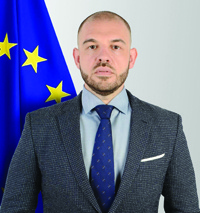KUWAIT: Kuwait has been making steps of progress in empowering women and protecting their rights, a senior European official said yesterday. "I welcome the 2020 adoption of the Law on the Protection against domestic violence," Head of Delegation of the European Union to the State of Kuwait Dr Cristian Tudor said in a statement marking the International Women's Day. "I also welcome the appointment of eight female judges for the first time in Kuwait's history."
"On 8 March, the world commemorates International Women's Day to mark social, economic, cultural and political achievements of women around the globe," Tudor said. "It is also a moment to reflect on the urgency of stepping up action to tackle inequality and injustice facing women and girls in order to meet the Sustainable Development Goals and in particular Goal 5 on gender equality."
Women empowerment remains a challenge for all countries, the senior official said, adding that the Delegation of the European Union looks forward to continue working with Kuwait in pursuit of gender equality. "Last year, the EU awarded Chaillot Prize for the promotion of human rights in the GCC to the Kuwaiti initiative 'Grey Area' for promoting the rights of children of Kuwaiti mothers and non-Kuwaiti fathers," he said.
Gender equality
"In 2020, the European Union (EU) stepped up its efforts to support gender equality and women's rights," Tudor noted. "The EU renewed its internal and external policy framework through the Gender Equality Strategy 2020-2025, and the EU's new Action Plan on Gender Equality and Women's Empowerment 2021-2025.
These policies place promotion of gender equality at the top of the EU's priorities as well as aim to accelerate progress on the empowerment of women and girls, and safeguard gains made since the adoption of the Beijing Declaration and its Platform for Action.
Twenty five years after the Beijing Declaration, the Generation Equality Forum convened by UN Women and co-chaired by France and Mexico will take place in Paris in June 2021. This historic gathering will develop an agenda to advance gender equality and women's rights by 2030."
COVID-19 pandemic
Since the beginning of the COVID-19 pandemic, women in particular have been disproportionally affected, Tudor further pointed out. "Stepping up action for gender equality is more important than ever before and is vital in the COVID-19 recovery," he stressed. "In order to achieve a sustainable, inclusive and fair recovery, women must be part of the decision making processes in all sectors, at all levels."
Tudor also quoted a statement by the EU Commissioner for International Partnerships, Jutta Urpilainen, in which she said: "Stronger engagement on gender equality is key to a sustainable global recovery from the COVID-19 crisis and building fairer, more inclusive, more prosperous societies. Women and girls are in the frontline of the pandemic and must be put in the driving seat of the recovery. As a gender-sensitive and responsive geopolitical Commission, we want to work more closely with our Member States, as well as all partners, in building a truly gender-equal world."
Work remains
Tudor admitted that while gender equality is a priority for the EU, a lot of work remains. "No country in the world is on track to achieve gender equality and empower all women and girls by 2030," he said. "Moreover, the health and socio-economic consequences of the COVID-19 crisis are disproportionately affecting women and girls. For example, because a higher proportion of women work informally and in vulnerable sectors, their job loss rate globally is 1.8 times greater than that of men. The poverty rate among women globally could go up by 9.1 percent."
"While we are marking International Women's Day, I pay tribute to the achievements of women all over the world. The EU is determined to be at the forefront of global efforts to achieve gender equality and women's empowerment and to continue working closely with all its partners," he concluded.




